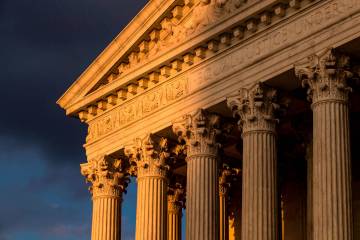EDITORIAL: Nevada Supreme Court rules for investor in super lien case
The Nevada Supreme Court perpetuated an absurd injustice last week when it decided that property rights and due process don’t apply to mortgage lenders. The justices ruled in favor of a speculator who in 2013 claimed clear title to a Las Vegas property by simply paying off $6,900 in back HOA dues despite the fact that Well Fargo held an $81,000 note on the home.
The dispute concerned a poorly written Nevada law passed in 1991 and intended to shield homeowner associations from financial stress triggered by delinquent dues payments. The statute permits HOAs to initiate “non-judicial” foreclosures in order to recoup the back payments.
But the law’s ambiguity led some courts to construe the measure as allowing those who satisfied the HOA “super” lien to wipe out all other claims against the property, including mortgage obligations. That means an investor could theoretically pick up a $500,000 home at an HOA auction by paying off a few thousand in back dues. The bank that issued the mortgage would be left holding a worthless piece of paper.
What reasonable person would consider this a rational outcome? And how could a court find such an obvious inequity to be consistent with constitutional principles?
Yet that’s precisely what the state high court concluded in Saticoy Bay v. Wells Fargo. The justices on Jan. 26 rejected the bank’s argument that the statute as interpreted violated due process norms while also running afoul of the Fifth Amendment’s takings clause.
Instead, the court found that “neither the HOA’s non-judicial foreclosure nor the Legislature’s enactment of the statutes constitute state action” and thus don’t amount to a taking or violate due process rights.
This defies common sense. To argue no “state action” was involved is to engage in feeble sophistry.
The justices hung this ruling, in part, on a 39-year-old U.S. Supreme Court case involving a warehouse owner who sold off a woman’s personal property after she refused to pay storage costs, which is hardly analogous to allowing a small lien payment to extinguish a lender’s legally binding mortgage deed.
In fact, the ruling contradicts a 9th U.S. Circuit Court of Appeals decision in August that found the Nevada law unconstitutional, which offers hope for further challenges.
All this is particularly egregious given there are plenty of alternative avenues to help HOAs recover delinquent fees that don’t run roughshod over the rights of mortgage companies.The fact is, an investor who satisfies a lien at an HOA auction should have to assume any outstanding mortgage payments if he hopes to claim the property.
In 2015, state lawmakers amended the statute to provide more notice to lenders regarding HOA foreclosures. But that’s not enough. This session, they should abolish the super lien concept altogether and craft a more equitable means of allowing HOAs to recoup money owed.
Until then, the state Supreme Court’s unfortunate decision weakens property rights and raises myriad questions about the enforcement of legal contracts in the state.

















